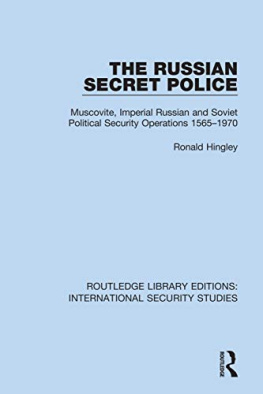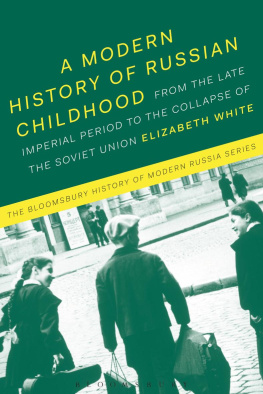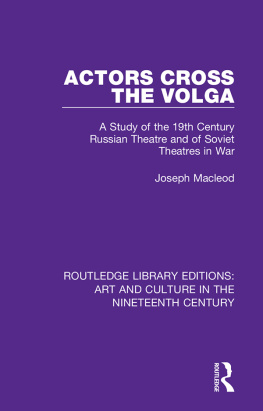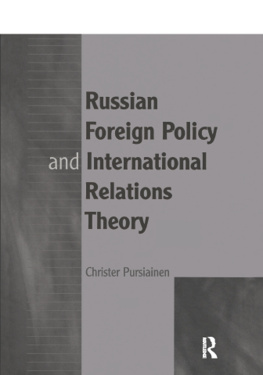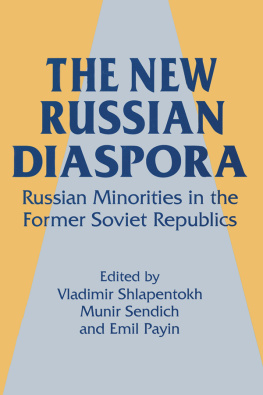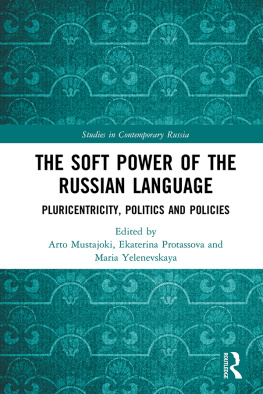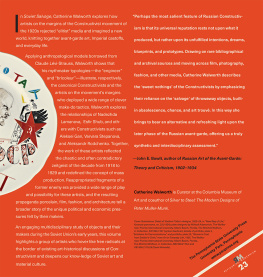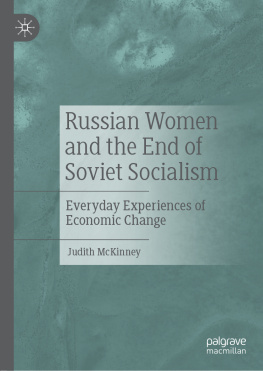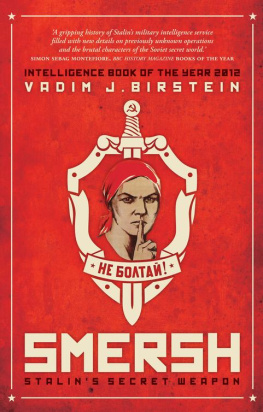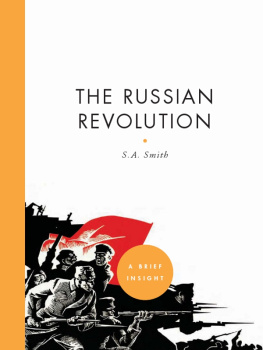ROUTLEDGE LIBRARY EDITIONS:
INTERNATIONAL SECURITY STUDIES
Volume 18
THE RUSSIAN SECRET POLICE
THE RUSSIAN SECRET POLICE
Muscovite, Imperial Russian and Soviet Political
Security Operations 15651970
RONALD HINGLEY

First published in 1970 by Hutchinson & Co (Publishers) Ltd
This edition first published in 2021
by Routledge
2 Park Square, Milton Park, Abingdon, Oxon OX14 4RN
and by Routledge
52 Vanderbilt Avenue, New York, NY 10017
Routledge is an imprint of the Taylor & Francis Group, an informa business
1970 Ronald Hingley
All rights reserved. No part of this book may be reprinted or reproduced or utilised in any form or by any electronic, mechanical, or other means, now known or hereafter invented, including photocopying and recording, or in any information storage or retrieval system, without permission in writing from the publishers.
Trademark notice : Product or corporate names may be trademarks or registered trademarks, and are used only for identification and explanation without intent to infringe.
British Library Cataloguing in Publication Data
A catalogue record for this book is available from the British Library
ISBN: 978-0-367-68499-0 (Set)
ISBN: 978-1-00-316169-1 (Set) (ebk)
ISBN: 978-0-367-75249-1 (Volume 18) (hbk)
ISBN: 978-0-367-75252-1 (Volume 18) (pbk)
ISBN: 978-1-00-316167-7 (Volume 18) (ebk)
Publishers Note
The publisher has gone to great lengths to ensure the quality of this reprint but points out that some imperfections in the original copies may be apparent.
Disclaimer
The publisher has made every effort to trace copyright holders and would welcome correspondence from those they have been unable to trace.
Ronald Hingley
The
Russian
Secret Police
Muscovite, Imperial Russian
and Soviet Political Security Operations
15651970

HUTCHINSON & CO ( Publishers ) LTD
178-202 Great Portland Street, London W1
London Melbourne Sydney
Auckland Johannesburg Cape Town
and agencies throughout the world
First published 1970
Ronald Hingley 1970
This book has been set in Baskerville type, printed in Great Britain
on antique wove paper by Anchor Press, and
bound by Wm. Brendon, both of Tiptree, Essex
ISBN 0 09 104140 6
Contents
Preface
Introduction
1 From the Oprichnina to the Decembrists (15651825)
2 The Third Section under Nicholas I (18261855)
3 The Third Section under Alexander II (18551880)
4 The Nineteenth-Century Okhrana (18801900)
5 The Okhrana in the Age of Assassinations (19011908)
6 The Decline and Fall of the Okhrana (19081917)
7 The Cheka (19171922)
8 The GPU/OGPU (19221934)
9 The NKVD under Yagoda and Yezhov (19341938)
10 Beria and the NKVD/NKGB (19381945)
11 Beria and the MVD/MGB (19451953)
12 The KGB under Khrushchev (19541964)
13 The KGB after Khrushchev (19641970)
Conclusion
Notes
Bibliography
Index
Preface
It is perhaps necessary to explain why secret rather than political or security has been attached to police in the main title of this book, for the fact is that the authorities concerned have conducted many of their activities openly, not to say blatantlyand often through the medium of officers wearing highly distinctive uniforms. There have, moreover, been occasions when Russian political security chiefs, both Imperial and Soviet, have explicitly spurned the term secret as applied to their organisations. When submitting his project for the institution of a higher police to the Emperor Nicholas I in 1826, for example, General Alexander Benckendorff rejected the whole concept of a secret police such as terrifies honest men, but is detected by scoundrels.
Over a hundred and thirty years later a similar idea was propounded by one of Benckendorffs successors as head of securityYury Andropov, Chairman of the Committee of State Security ( KGB). Speaking in December 1967, on the fiftieth anniversary of the founding of the first Soviet political police authority, he stated that: Only our enemies... portray the Soviet security service as some sort of secret police. As this remark indicates, the Soviet authorities reject not only secret, but also police (in Russian, politsiya )a term which they do not recognise as applying to their own forces of domestic control, but employ only in descriptions of bourgeois (i.e. non-Communist) countries. There seemed, however, no more reason for following, on these pages, Soviet practice in the use of the word police than there is for accepting the curious term bourgeois as applicable to oneself and to the society in which one lives.
Chairman Andropovs claim, that Russian security transactions have fallen short of total secrecy, receives ample confirmation from the existence of so many books and articles devoted to aspects of Russian police affairs over the ages. The Bibliography of the present volume, for example, contains over three hundred titlesbut remains highly selective. Should one wish to invoke a more comprehensive compilation, Edward Ellis Smiths bibliographical The Okhrana fills an entire volume and contains 843 itemsyet confines itself to works bearing on the period 1880-1917.
For such reasons the titles political police, security police or political security police might have been preferred here. However, it has seemed on balance sensible to retain the generally accepted, if somewhat looser term secret police as appropriate to a general study which covers more than four centuries activity within a regrettably small compass. Despite extensive later leaks by escapees from Siberia, defecting OGPU men and so on, the organisation and policies of the various successive Russian police authorities have generally been shrouded in secrecy at the actual time of operations. Much of the material, indeed, still does remain buried in mystery. For example, the archives of the Third Section (1826-1880) have remained inaccessible to leading authorities on the subject (after certain periods of relaxation), just as do those of the Cheka, OGPU, NKVD, MVD and KGB. And yet an enormous amount is known, or can be reliably deduced, about all these organisations.
The present book is not primarily or even secondarily an administrative study of the secret policean aspect of Russian history which might richly repay further investigation. At the moment adequate detailed administrative studies are unfortunately available only for limited areas of the field. Outstanding among such works are N. B. Golikovas Politicheskiye protsessy pri Petre I and P. S. Squires The Third Department. Yet even Mr. Squires excellent book deals only with the first thirty years of the Third Department (here called the Third Section), leaving the period 1855-80 uncovered. This and other phases, such as that of the Okhrana (1880-1917), await administrative historians equally scholarly and exhaustiveas does the whole Soviet period, though one must not say this without passing reference to E. J. Scotts admirable article on the Cheka, to Wolins and Slussers valuable manual, to Boris Lewytzkyjs helpful book, and to Robert Conquests monumental The Great Terror, which touches on many aspects of NKVD organisation in detail inevitably horrific However, to have concentrated unduly, within so general a study as the present, on problems of organisation, demarcation, chain of command, recruiting, appointments and functions, would have been to risk being as dull as the above-mentioned authorities are fascinatingand without making any major impact on an aspect of police work which requires scrutiny in the minutest detail. The present study, by contrast, aims to describe secret police operations in general, concentrating on their influence on society at large as one of the most formidable forces at work within the Russian Empire and Soviet Union.
Next page
